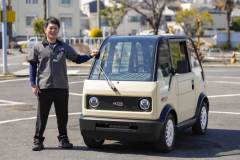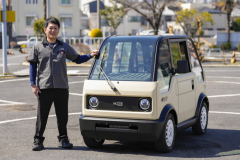Kazunari Kusunoki, chief executive officer of KG Motors, shows off the company’s mibot ultra-compact electric vehicle in Tokyo on March 10. (Photo: Bloomberg)
In the rural suburbs of Hiroshima, a Japanese startup is trying to kickstart the country’s electric vehicle market with the smallest, cheapest car it can possibly make.
KG Motors has developed a battery-powered one-seater that resembles a futuristic golf cart more than it does a modern EV, much less a traditional car. And yet well over half of the 3,300 units it plans to deliver in 2027 have already been pre-sold to customers.
Incidentally, that puts it on track to sell more EVs in Japan than the world’s biggest automaker, Toyota Motor Corp, which shifted around 2,000 such vehicles in all of 2024. In a country where EVs are still a rare sight, KG Motors is trying to bust a burgeoning myth: that bigger is better.
“Cars are simply too big,” founder and chief executive officer Kazunari Kusunoki said. “Seeing so many big cars travelling Japan’s narrow streets — that’s where this all began for me.”
At under 1.5 metres in height, the KG Motors mibot has a range of 100 kilometres, a charging time of five hours and a top speed of 60 kilometres per hour. It will cost ¥1 million ($7,000 or 230,000 baht) before tax when production starts in October at KG Motors’ new factory east of the city. That’s about half the price of Japan’s most popular EV, the Nissan Sakura.
To date, domestic and foreign automakers alike have struggled to find traction for EVs in Japan. The cars accounted for about 140,000 units or around 3.5% of total vehicle sales in 2023, a far cry from the global average of 18%, according to BloombergNEF. The Chinese behemoth BYD, for example, sold 2,223 automobiles in Japan in 2024 — a sliver of the 4.3 million it delivered worldwide.
Toyota and its Japanese peers, meanwhile, are at odds with other legacy automakers that hold an all-electric view of the future. Toyota has long harboured a multi-pathway approach to a greener tomorrow, one where EVs as well as ga
Read More






